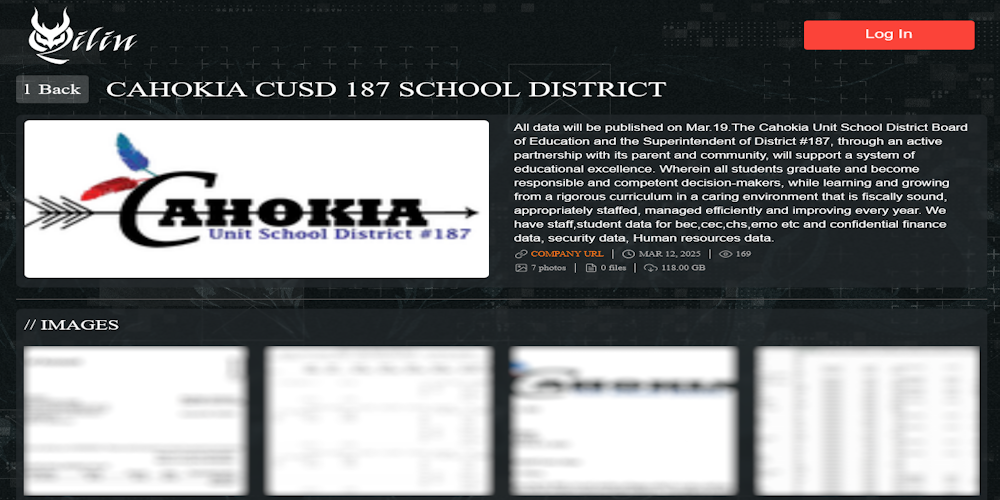CyberAlerts is shutting down on June 30th, 2025. Thank you for your support!
Example Searches:
CVE
Threat Actors
Countries
Vendors
Severity
Known Exploited

|
EPSS Score: 0.02%
March 12th, 2025 (4 months ago)
|

|
EPSS Score: 0.02%
March 12th, 2025 (4 months ago)
|

|
EPSS Score: 0.02%
March 12th, 2025 (4 months ago)
|

|
EPSS Score: 0.01%
March 12th, 2025 (4 months ago)
|

|
March 12th, 2025 (4 months ago)
|

|
Description: Cahokia Unit School District #187 Allegedly Falls Victim to Qilin Ransomware Attack
March 12th, 2025 (4 months ago)
|

|
Description: In the past, the vulnerability was exploited to drop Mirai botnet malware. Today, it's being used once more for another botnet campaign with its own malware.
March 12th, 2025 (4 months ago)
|
|
CVE-2025-29891 |
Description: Bypass/Injection vulnerability in Apache Camel.
This issue affects Apache Camel: from 4.10.0 before 4.10.2, from 4.8.0 before 4.8.5, from 3.10.0 before 3.22.4.
Users are recommended to upgrade to version 4.10.2 for 4.10.x LTS, 4.8.5 for 4.8.x LTS and 3.22.4 for 3.x releases.
This vulnerability is present in Camel's default incoming header filter, that allows an attacker to include Camel specific headers that for some Camel components can alter the behaviours such as the camel-bean component, or the camel-exec component.
If you have Camel applications that are directly connected to the internet via HTTP, then an attacker could include parameters in the HTTP requests that are sent to the Camel application that incorrectly get translated into headers.
The headers could be both provided as request parameters for an HTTP methods invocation or as part of the payload of the HTTP methods invocation.
All the known Camel HTTP component such as camel-servlet, camel-jetty, camel-undertow, camel-platform-http, and camel-netty-http would be vulnerable out of the box.
This CVE is related to the CVE-2025-27636: while they have the same root cause and are fixed with the same fix, CVE-2025-27636 was assumed to only be exploitable if an attacker could add malicious HTTP headers, while we have now determined that it is also exploitable via HTTP parameters. Like in CVE-2025-27636, exploitation is only possible if the Camel route uses particular vulnerable components.
EPSS Score: 0.06%
March 12th, 2025 (4 months ago)
|
|
CVE-2025-27915 |
Description: An issue was discovered in Zimbra Collaboration (ZCS) 9.0 and 10.0 and 10.1. A stored cross-site scripting (XSS) vulnerability exists in the Classic Web Client due to insufficient sanitization of HTML content in ICS files. When a user views an e-mail message containing a malicious ICS entry, its embedded JavaScript executes via an ontoggle event inside a tag. This allows an attacker to run arbitrary JavaScript within the victim's session, potentially leading to unauthorized actions such as setting e-mail filters to redirect messages to an attacker-controlled address. As a result, an attacker can perform unauthorized actions on the victim's account, including e-mail redirection and data exfiltration.
EPSS Score: 0.03%
March 12th, 2025 (4 months ago)
|
|
CVE-2025-27914 |
Description: An issue was discovered in Zimbra Collaboration (ZCS) 9.0 and 10.0 and 10.1. A Reflected Cross-Site Scripting (XSS) vulnerability exists in the /h/rest endpoint, allowing authenticated attackers to inject and execute arbitrary JavaScript in a victim's session. Exploitation requires a valid auth token and involves a crafted URL with manipulated query parameters that triggers XSS when accessed by a victim.
EPSS Score: 0.03%
March 12th, 2025 (4 months ago)
|
